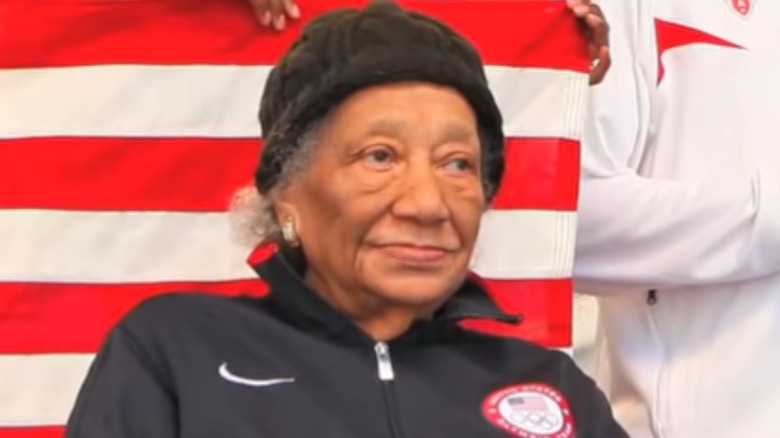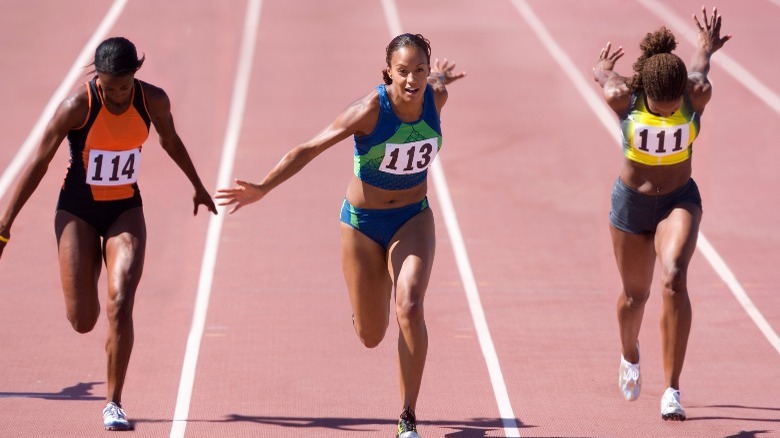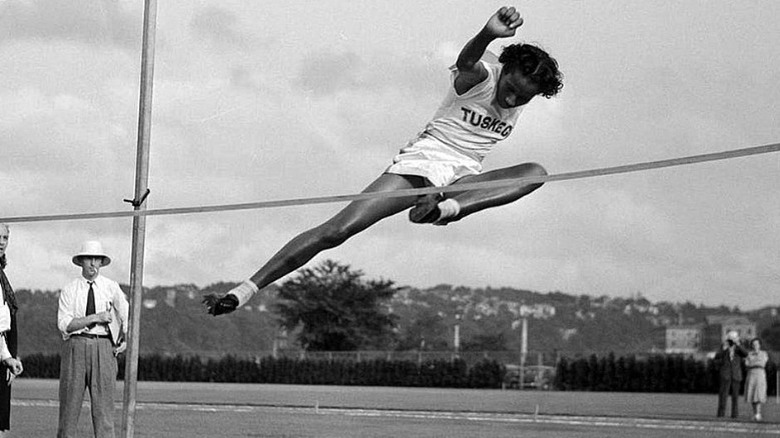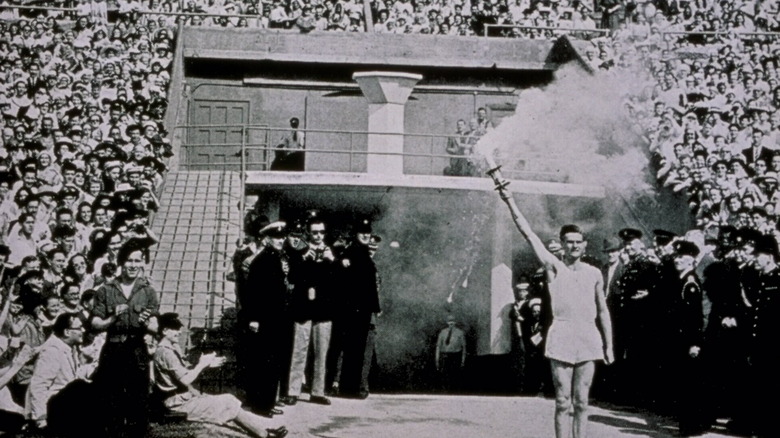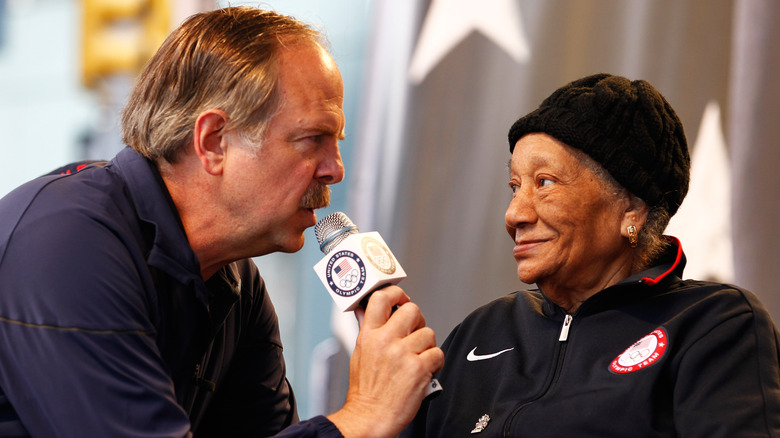How Alice Coachman Became The First Black Woman To Make Olympic Track And Field History
In the world of sport, there have been a lot of "firsts." Jackie Robinson was the first African- American to break the color barrier in Major League Baseball. Roger Bannister (per Britannica) was the first man to run a mile in under four minutes, in 1954. Duke Kahanamoku was the first Native Hawaiian Olympian and popularized surfing across the world. This list could get pretty extensive if you examined all of sport history, but in the last century, sport and athletics have ceased to be only for the guys.
Along with the extensive list of male athletes who achieved some notable firsts, there have also been some incredible women who broke some barriers, too. Kathrine Switzer was the first woman to run the Boston Marathon. Althea Gibson (per History) was the first African American woman to win Wimbledon. Janet Guthrie was the first woman to race in the Indy 500. There is one name that is finally being talked about more lately, and that is Alice Coachman.
Humble beginnings
A native of Albany, Georgia, Alice Coachman was born to Fred and Evelyn Coachman on November 9, 1923 (per Women's History). She came from a rather large family, including nine siblings, which meant she did her part to contribute to the household. In addition to going to school, she also found work picking fruit or nuts to sell, and picked cotton to help support her family.
It's amazing to think that as busy as she was with school and working from a young age, that Alice could find time to do anything else. She managed to do just that as it became abundantly clear that Alice was not only hardworking, but ridiculously athletic.This became especially evident when she reached high school, where the boys' track coach took her under his wing (per Biography). Her athletic talent was eventually recognized by the Tuskegee Institute, and they offered her a scholarship when she was just 16 years old.
Budding athletic career
Though Coachman's aptitude for athletics was obvious, her choice of sport, track and field, was actually rather frowned upon. According to Women's History, women doing sports of any kind at this time was not widely accepted in general, but if a woman was going to compete, it was preferable she choose a "lady-like" sport. Activities like tennis and swimming were considered more appropriate for women, but Coachman was a multi-talented athlete, and a great one at that.
When she began her athletic career at the Tuskegee Institute, she participated on both the school's basketball and track and field teams. Where she stood out the most was on the track. Her greatest successes were in the sprinting events and the high jump, where she won four national championships. As she quickly became recognized as one of the best athletes in the country, people began to suggest that Coachman try out for the biggest athletic competition of them all, the Olympics.
The setbacks
Though she was exceptionally athletic and could beat just about everyone, Coachman's road to making Olympic history was not an easy one. She had two major things going against her. She was black, and she was a woman. Either one of those things during this period of American history would have been difficult to overcome, but because she was both, it made things even more difficult. When she was younger, Coachman was banned from training with white children her age and from using the same training facilities they used (per Women's History).
Despite the discrimination she experienced as a child, Coachman kept training and was successful at the college level. Remember those folks that thought she should try out for the Olympics? They were right, as she was a decorated national champion, and won the American national title every year between 1939 and 1948. Unfortunately, the timing of her successes was not ideal for the Olympic games, as both the 1940 and 1944 Games were canceled due to World War II. It was not until the 1948 Olympics in London that Coachman finally had her shot to compete.
Olympic dreams come true
Despite having a nagging back injury, Coachman competed for Olympic gold in the high jump at the XIV Olympiad. According to Biography, she cleared a height of 5 feet 6 and ⅛ inches, setting a new record and clinching Olympic gold. While this was an accomplishment all on its own, it was extra special because this also made her the first Black woman to win an Olympic gold medal.
Additionally, Coachman was also the only American woman to win a gold medal at any event in the 1948 Games (per Women's History). Just days before her victory, Coachman's fellow teammate Audrey Patterson became the first Black woman to win a medal of any kind when she took bronze in the 200m. There was also a Dutch sprinter named Fanny Blankers- Koen who became the first woman to take home four Olympic gold medals. In the 1948 Olympics, out of 4,000 athletes who participated, only 390 were women, and this makes these accomplishments in women's sports extra special.
Beyond the Olympics
Following her Olympic triumph, Coachman returned to the U.S. and became a bit of a celebrity. She was congratulated by President Harry Truman and had a celebration thrown for her by legendary jazz musician Count Basie (per Women's History). She returned to college and finished her degree, and technically had retired from athletic competition. In 1952, she secured a deal with the Coca-Cola Company as a spokesperson, which also made her the first African American to have an endorsement deal as well.
In the later part of her life, Coachman established the Alice Coachman Track and Field Foundation with a mission of helping support younger athletes in pursuing their dreams, as well as assisting retired Olympic veterans. When the Olympic Games returned to Atlanta in 1996, she was honored there as one of History's 100 Greatest Olympians. Additionally she was inducted into 9 different halls of fame over the years, including the U.S. Olympic Hall of Fame. An elementary school (above) was named in her honor in Albany, Georgia; it opened in 1999 (per the Dougherty County School System). Alice Coachman passed away at the age of 90 on July 14, 2014.
